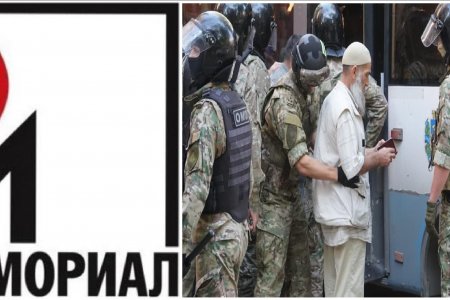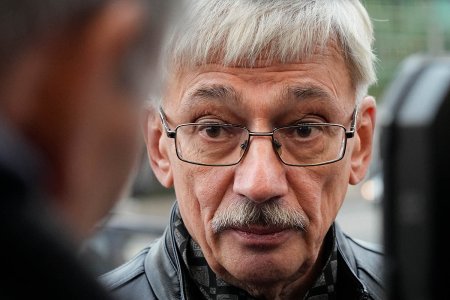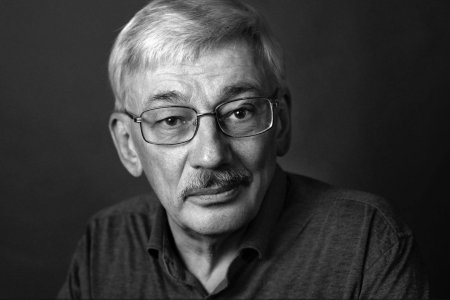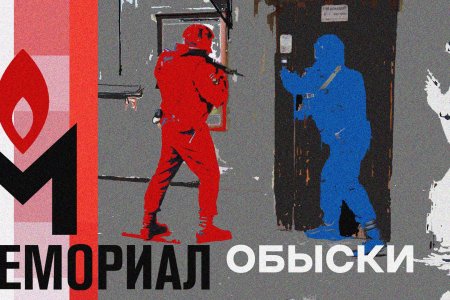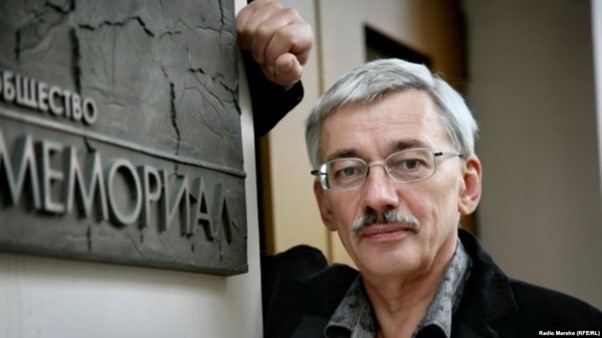
Russia has carried out mass raids and searches of the office of the Memorial Society and its members, with its co-chairman, Oleg Orlov facing criminal charges and a likely prison sentence for supposedly ‘discrediting the Russian armed forces’. The move comes a little over a year after Russia forcibly dissolved International Memorial and the Memorial Human Rights Centre, and almost exactly three months after Memorial became laureate of the 2022 Nobel Peace Prize, together with Ukraine’s Centre for Civil Liberties and the Belarusian Viasna Human Rights Centre, together with its leader Ales Bialiatski.
The pretext for the heavy-handed methods used on 21 March was a criminal investigation initiated on 3 March 2023 over so-called ‘rehabilitation of Nazism’. This was allegedly on the basis of a complaint from the NGO ‘Veterans of Russia’ who claimed to have found around twenty names on Memorial’s List of Victims of Stalin’s Repression who were convicted of collaborating with Nazi Germany. The current regime is clearly using this charge in an attempt to discredit the internationally respected Memorial and the vital work it has done in studying the Soviet Terror and naming both its victims and the perpetrators. Although the offensive against Memorial began shortly before Russia’s invasion of Crimea and was doubtless prompted in part by Memorial’s first stand on Russia’s aggression, the first complaints about names on the List of Victims came around the time that the regime was seeking the organization’s dissolution. In December 2021, Memorial reacted to complaints echoed by Russian leader Vladimir Putin about three people on the List, by saying that the three had been removed. Memorial pointed out that in a list containing over a million names, mistakes of this nature were surely inevitable. The same clearly applies now.
Russia’s attack on historians of the Terror, and particularly Yury Dmitriev, the Head of the Karelia branch of Memorial, used scurrilous and entirely fabricated ‘child pornography’ charges to try to discredit both Dmitriev and Memorial. The same method is now being used with this ‘rehabilitation of Nazism’ case, and the high-profile searches of a large number of members of Memorial. Most of the initial reports about the events suggest that the criminal charges against Oleg Orlov were over this investigation. Had there been any possible grounds, this would certainly have been the case. Instead, however, all of those who faced raids on 21 March have, at most, ‘witness’ status into the so-called ‘rehabilitation of Nazism case’.
It became clear late on Tuesday evening that Orlov has been charged under Article 280.3 § 1 of Russia’s criminal code, for the supposedly repeated act of “discrediting Russia’s army”. This is now a ‘criminal’ charge, after two previous prosecutions under the analogous article of the code of administrative offences. The charges are part of the draconian legislation aimed at silencing criticism of Russia’s full-scale invasion of Ukraine and rushed through within 10 days of the invasion.
Memorial’s Alexander Cherkasov reports that Orlov’s laptop was removed, as well as three hard disks; several flash drives; a telephone; Memorial stickers; a badge reading “No to war” [which itself has led to people facing administrative prosecution under the analogous article on ‘discrediting the Russian army’). They also removed a book, entitled ‘Russia – Chechnya: a chain of mistakes and crimes’.
Orlov was released under a signed undertaking not to leave the city. He explained that he had refused to sign a non-disclosure undertaking which he considers unwarranted and unlawful. He had, however, been warned that, even without such a signed document, he still faced criminal liability for divulging details. Russia has increasingly used such undertakings in occupied Crimea to prevent lawyers from revealing the flawed nature of the charges against Crimean Tatar and other Ukrainian political prisoners, and the situation here seems similar.
It is, however, known that the charges this time are over the posting on his Facebook page of the Russian translation of his article “They wanted fascism. They got it”, which was published by the French Mediapart on 14 November 2022. Cherkasov’s post, signed ‘Memorial Centre for the Defence of Human Rights’, states that the Mediapart article is about Russia’s invasion of Ukraine, and that the criminal charge, under Article 280.3 § 1, was initiated by I. Savchenko from the Investigative Committee.
The article is quoted as saying that “The bloody war launched by Putin in Ukraine is not only the mass killing of people, the destruction of infrastructure, of the economy, of cultural sites of this wonderful country. It is not only the crushing of the foundations of international law. It is also the gravest of blows against Russia’s future. A country which, 30 years ago, moved from communist totalitarianism has descended back into totalitarianism, but now fascist.”
According to the warrant, Orlov was somewhere in Moscow when he suddenly got “the criminal plan to discredit the Russian Federation’s armed forces.” There appears to already be a ‘expert opinion’ regarding this article. The ‘experts’ found that it characterised the actions of the Russian armed forces as “linked with genocide; the killing of people’ the destruction of infrastructure and of the economy” and as “aimed against the existing constitutional order or violating the existing order.”
Oleg Orlov is now facing imprisonment not only for expressing his negative opinion about Russia’s war against Ukraine, but also for stating facts (the killing of civilians, destruction of infrastructure, etc.). Russia’s attempt to outlaw facts by prosecuting those who report them seems especially grotesque given the International Criminal Court’s first arrest warrant against Putin over alleged war crimes in Ukraine and the absolutely damning report, just published by the UN Human Rights Council-commissioned Independent International Commission of Inquiry on Ukraine. This mentioned the same actions as Orlov’s article, and spoke squarely of multiple violations of international humanitarian law, with many of these amounting to war crimes.
Russia’s attacks on Memorial and the Memorial Human Rights Centre were always linked with the organizations’ willingness to speak out against Russia’s occupation of Crimea; its aggression against Ukraine and its political persecution of Crimean Tatars and other Ukrainian citizens. Despite the attempt to muddy the issue by throwing in supposed charges of ‘rehabilitation of Nazism’, the same motives are clearly behind the new attack launched, both against Memorial in general, and against Oleg Orlov.
